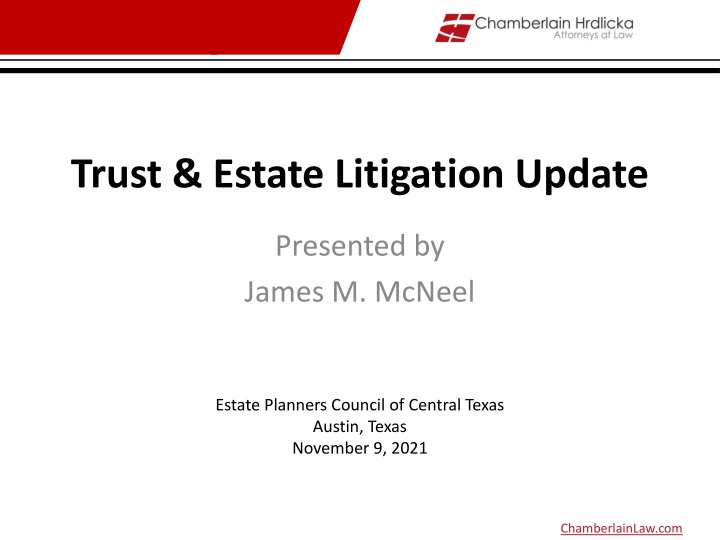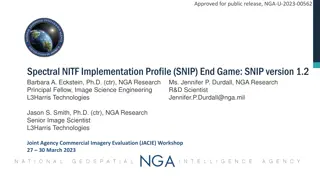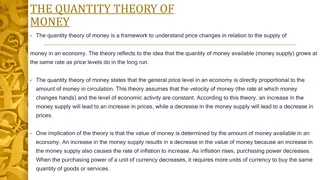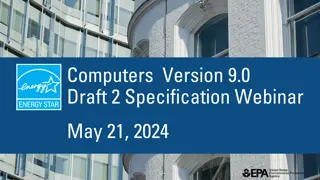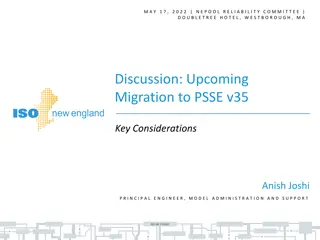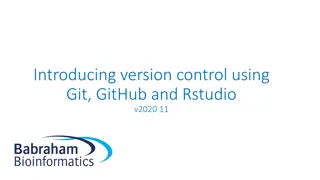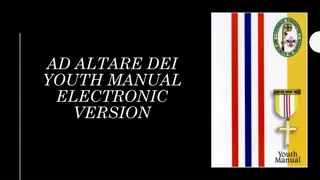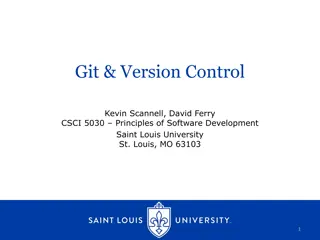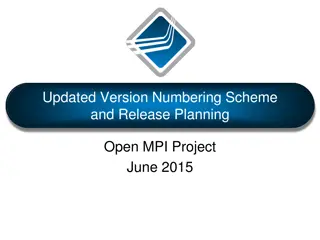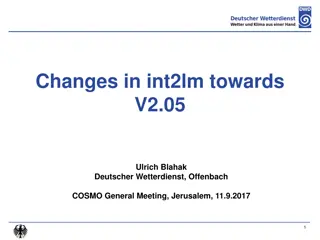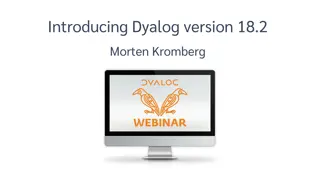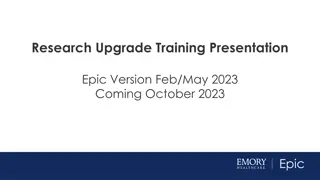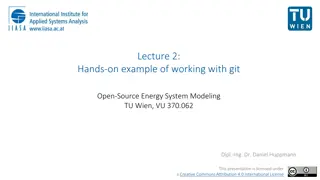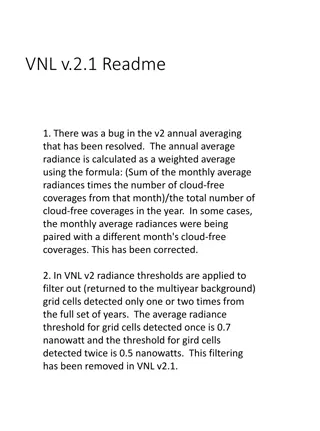Trust & Estate Litigation Update: Moody v. Moody Case Overview
In the Moody v. Moody case, Linda challenges a marital property agreement post the death of her father, Decedent. The agreement aimed to equalize the estate plans for Decedent and his wife, Darlene, impacting inheritance shares of Linda, her siblings, and step-siblings. Legal proceedings ensued surrounding the validity of the agreement, with Linda seeking to overturn it and claim the entirety of a valuable ranch property. The case involves complex family dynamics, inheritance rights, and legal standing regarding estate planning documents.
Download Presentation

Please find below an Image/Link to download the presentation.
The content on the website is provided AS IS for your information and personal use only. It may not be sold, licensed, or shared on other websites without obtaining consent from the author.If you encounter any issues during the download, it is possible that the publisher has removed the file from their server.
You are allowed to download the files provided on this website for personal or commercial use, subject to the condition that they are used lawfully. All files are the property of their respective owners.
The content on the website is provided AS IS for your information and personal use only. It may not be sold, licensed, or shared on other websites without obtaining consent from the author.
E N D
Presentation Transcript
Trust & Estate Litigation Update Presented by James M. McNeel Estate Planners Council of Central Texas Austin, Texas November 9, 2021 ChamberlainLaw.com ChamberlainLaw.com
Trust & Estate Cases and Key Issues Marital Agreements and standing to attach them under the Texas Estates Code Moody v. Moody Equitable Estoppel of Stepchild In re Estate of Hines Construction of wills and Trusts ConocoPhillips Co. v. Ramirez In re Estate of Hunt v. Vargas Isaac v. Burnside Ochse v. Ochse ChamberlainLaw.com ChamberlainLaw.com
Moody v. Moody 613 S.W.3d 707 (Tex. App. Houston [14th Dist.] 2020) Linda Moody was the daughter of Decedent. Decedent and his wife (Linda s stepmom), Darlene, were married for fifty years. On April 16, 2014, Decedent executed his will and entered into a marital property agreement ( agreement ) with Darlene. In his Will, Decedent named Moody National Bank ( MNB ) as independent executor and as trustee to his revocable trust. Decedent died on July 14, 2014. Linda challenged the marital property agreement and not the will or trust. ChamberlainLaw.com ChamberlainLaw.com
Moody continued Will left everything to MNB, as trustee of the trust. The trust left Any property belonging to Darlene to Darlene Personal property between Darlene and children Remainder goes into marital trust(s) exempt and nonexempt and family trust The marital trust(s) and family trust continue for Darlene for life. The overall estate plan was meant to equalize Decedent s and Darlene s estate plans so that their children would receive 5 equal shares. Decedent s children from a prior marriage (1) Linda, (2) Elizabeth Moody and (3) Janice Moody. Decedent and Darlene s son (4) Billy; and Darlene s daughter from a prior marriage (5) Valerie. The equalization was going to be accomplished through the community property between Decedent and Darlene. ChamberlainLaw.com ChamberlainLaw.com
Moody continued The marital agreement converted Decedent s separate property ranch worth approx. $45M to community property. By challenging the marital agreement, Linda and her 2 sisters would receive the entirety of the ranch. In November, 2016, Linda filed a suit seeking a temporary injunction and declaration that the agreement is void and unenforceable and that Decedent lacked capacity to enter into the agreement. In February, 2018, Linda amended her claims for breach of fiduciary duty and fraud against Darlene. The trial court found in favor of Linda on all counts. MNB and Darlene appealed asserting Linda lacked standing to challenge the marital agreement. ChamberlainLaw.com ChamberlainLaw.com
Moody continued Linda asserted that she had standing under the Tex. Fam. Code 4.205 as an heir of the estate. The Court rejected this argument on the basis that Linda was not an heir because Decedent died testate. Linda was not challenging the will or trust. Also, the language of 4.205 provides that an heir or personal representative may bring suit. Assuming she was an heir, the personal representative, MNB, chose not to bring the suit did not open the door for Linda to bring suit. This would require the statute to read heir and personal representative. ChamberlainLaw.com ChamberlainLaw.com
Moody continued Linda asserted that she had standing under the Tex. Estates Code as an heir of the estate. Again, the determination of an heir was irrelevant because Linda was not challenging the will or trust. Linda failed to assert derivative standing to bring a suit on behalf of the estate or trust. The general rules are: (1) a personal representative may bring suit on behalf of an estate; and (2) a trustee may bring suit on behalf of a trust. Linda made no references or cites to any reason why MNB would not bring suit on behalf of the estate or trust. ChamberlainLaw.com ChamberlainLaw.com
Moody continued Linda asserted that she had standing under the Tex. Family Code to challenge the marital property agreement as a partition agreement. The marital agreement contained provisions of a partition agreement. Linda failed to assert any argument or provide authority for standing to challenge the marital agreement as a partition agreement. Tex. Fam. Code 4.205 did not apply to partition agreements. ChamberlainLaw.com ChamberlainLaw.com
Moody continued Linda lacked standing to assert breach of fiduciary duty claims against Darlene in connection with the creation of the marital agreement. Because these are claims that could have been asserted by Decedent they are survival claims. Survival claims become part of Decedent s estate at death. The personal representative must bring the suit. Again, Linda failed to plead that she had derivative standing to sue on behalf of the Decedent s estate. ChamberlainLaw.com ChamberlainLaw.com
Moody continued Linda failed to demonstrate any circumstances that would give her standing and/or capacity to bring. Key drafting consideration: Plaintiffs must properly plead and prove derivative standing. ChamberlainLaw.com ChamberlainLaw.com
In re Estate of Hines No. 06-20-00007-CV, 2020 Tex. App. LEXIS 8000 (Tex. App. Texarkana Oct. 8, 2020) Leslie Earnest Hines (Hines) married Betty Jo Hines in 1979. Betty Jo had a 10 year old son, Brian Hilton ( Hilton ). Hines had no biological children and raised Hilton. Hines died intestate on October 15, 2016. Hines s sister filed an application to determine his heirs in July, 2018. The trial court determined that Hines s heirs were Betty Jo (spouse), sister, brother, nieces and nephews not Hilton. A year later, Hilton filed a motion for new trial on the basis that he was Hines s son through equitable adoption. In October, 2019, the trial Court again determined Hines s heirs to be his spouse, sister, brother, nieces and nephews. Hilton appealed. ChamberlainLaw.com ChamberlainLaw.com
Hines continued To satisfy that Hines equitably adopted Hilton, Hilton needed to satisfy the following: 1. Hines executed a statutory instrument of adoption in the office of the county clerk and failed to do so because of some defect in the instrument or its execution; OR 2. Hines agreed with the child to be adopted or with the child s biological parents, in writing or orally, that he would adopt Hilton. The Court noted that all cases supporting adoption by estoppel required proof of an agreement or contract, in writing or orally, to adopt. ChamberlainLaw.com ChamberlainLaw.com
Hines continued The evidence offered show that: Hines wanted to adopt Hilton and discussed the possibility of adopting Hilton when he was younger, but because of Hilton s reluctance, Hines chose to put it off. Hilton s relationship with Hines was similar to a parent-child and at times they held each other out as family (father or son). The evidence offered did not show that: Hines entered into any agreement with Hilton s biological parents to adopt him. Hines entered into any agreement with Hilton to adopt him. Notably missing was any testimony from Hilton s mother/Hines s surviving spouse, Betty Jo. ChamberlainLaw.com ChamberlainLaw.com
Hines continued The Court concluded that the evidence was sufficient to establish that Hines never agreed to adopt Hilton. At best, Hines promised to do so in the future but never actually went through with any agreement to do so. Key drafting consideration: There must be proof of an agreement to adopt a child for equitable adoption to exist. ChamberlainLaw.com ChamberlainLaw.com
Solutions to Avoid Hines Draft! Draft! Draft! Prepare a will/trust including your stepchild. The law of most jurisdictions makes it difficult for a stepparent to adopt a child with two biological parents. Texas Two-Step: (1) Must bring a suit to terminate one biological parent s rights; and (2) must be in the best interest of the child for the adoption to occur. Expensive, time consuming and very difficult. Best Alternative: Draft a will/trust naming the stepchild as your child to include them in your estate plan, which also avoids intestacy. In Hines, Hilton was 10 in 1979. He turned 18 in 1987. After 1987, more than 25 years passed before Hines died. During this 25 year period, Hines could have adopted Hilton as an adult under Tex. Fam. Code Ch. 162, which would have made Hilton his adopted child for purposes of the Tex. Est. Code. All that would have been required was the consent of (1) Betty Jo on the petition to adopt and (2) Hilton. ChamberlainLaw.com ChamberlainLaw.com
ConocoPhillips Co. v. Ramirez 599 S.W.3d 296 (Tex. 2020) In 1941, Ramirez died and left a 7,000 acre ranch to his children: Leon and Felicidad. Leon and Felicidad partitioned the surface into 2 separate 3,500 acre tracts and continued to own the minerals in undivided interests. Leon died in 1966, leaving his 3,500 acre ranch and undivided mineral interests in 2 equal shares: 1 share to his wife, Leonor; and 1 share equally divided between his children. Leonor and the children again partitioned the property, which provided in relevant part that: (1) Leonor and her son, Leon Oscar, owned 1,058 acres known as Las Pierdras Ranch in undivided interests; and (2) Leonor owned an undivided 1/4 mineral interests in the 7,000 acres. In 1987, Leonor created her will leaving in relevant part: (1) Leon Oscar a life estate her 1/2 undivided interests in Las Pierdras Ranchwith remainder to Leon Oscar s children; and (2) remainder of her estate in equal shares to her 3 children. Leonor died in 1988. Leon Oscar died in 2006. Leon Oscar s children brought suit for a determination that the remainder of Leonor s estate did not include the minerals in Las Pierdras Ranch. In other words, the life estate to Leon Oscar in Leonor s 1987 will transferred the minerals in Las Pierdras Ranch to Leon Oscar not under the residuary to Leonor s 3 children. The Trial Court determined that the minerals were transferred to Leon Oscar as a life estate and awarded damages to Leon Oscar s children of $12,000,000. The appellate court affirmed. ChamberlainLaw.com ChamberlainLaw.com
Ramirez continued The Texas Supreme Court reviewed the Will to determine whether Leonor s devise of all right, title and interest in and to Ranch Las Pierdras to Leon Oscar refers only to the surface estate only or also included the mineral estate? ChamberlainLaw.com ChamberlainLaw.com
Ramirez continued In construing the Will, the Court s focus is on the testator s intent from within the 4 corners of the will, if possible, and determined as of the time the will is executed. If a term is ambiguous, the Court considers the circumstances existing when the will was executed. All right, title and interest in and to Ranch Las Pierdras was open to interpretation. ChamberlainLaw.com ChamberlainLaw.com
Ramirez continued Ranch Las Peirdras was capitalized an in quotations, which indicated that the term had a special mean when the Will was executed. Reviewing the partition agreement signed by Leonor and her children, the surface in the ranch specifically called it Las Pierdras Pasture and Las Pierdras Ranch without similar reference to the minerals. A 1990 lease executed 2 years after Leonor s death by all 3 of the children treated the minerals as being transferred to them under the residuary each owned an equal 1/3 in the minerals. Other leases were executed similarly between the 3 siblings. If there was any doubt as to the meaning of the transfer of the life estate to Leon Oscar, he could have raised it while he was alive and entering into leases with his siblings that affected the mineral estate of the ranch. ChamberlainLaw.com ChamberlainLaw.com
Ramirez continued The Texas Supreme Court held that the life estate only included the surface of the ranch not the mineral interests. ChamberlainLaw.com ChamberlainLaw.com
Solutions to Avoid Ramirez Draft! Draft! Draft! The Will should have specifically stated only the surface passed under the life estate. While there was no mention of other defenses, this case could have been decided on statute of limitations. In its Will construction analysis, the Court seemed to improperly consider actions of the parties after the Will was executed leases entered into by the children. While the result would have been the same, the Court should not have considered any actions by the parties after the execution of the Will under Texas construction law. If there was any doubt as to the ownership of the minerals, the parties could have considered executing a stipulation of interest affirming that the minerals passed to Leonor s children equally. ChamberlainLaw.com ChamberlainLaw.com
In re Estate of Hunt v. Vargas 597 S.W.3d 912 (Tex. App. Houston [1st Dist.] 2020) Debra Hunt s Will disposed of her personal property as follows: Section 1. I hereby make the following specific bequests: 1. I give all of my family photos, furnishings and mementos inherited from our grandparents or our parents to Tracy ; 2. I give all of my remaining household and personal property to Arabia. Section 2. I hereby give all of the remainder of the property, wherever located, which I may own at the item of my death as follow[s]: Fifty percent (50%) to Tracy and her issue, per stripes and not per capita; and Fifty percent (50%) to Lina and Andrea, and each of their issue, per stirpes and not per capita. Andrea and Lina are the daughters of Debra s prior partner who died prior to Debra. Tracy was Debra s sister. Arabia was Debra s partner on her date of death. Arabia contends that personal property included intangible personal property such as the bank accounts in the estate. Tracy and Andrea contend that it did not include intangible personal property. On summary judgment, trial court interpreted Debra s Will that personal property included intangible personal property. The appellate court affirmed. ChamberlainLaw.com ChamberlainLaw.com
Hunt continued Again, the Court s focus was on the testator s intent from within the 4 corners of the Will, if possible, and determined as of the time the will is executed. Key point for drafting: The Court generally gives words their plan, ordinary meaning unless the Will shows contrary intent. ChamberlainLaw.com ChamberlainLaw.com
Hunt continued The Court focused on the general unqualified meaning of personal property : The unqualified reference to property encompasses everything of exchangeable value that the testator owned, including real and personal property, whether tangible or intangible. In its ordinary usage, the term property is comprehensive. Personal property, in contract, excludes real property but otherwise remains broad in definition, including everything other than real property that is subject to ownership. Because personal property has a settled legal meaning, a court ordinarily does not need to look beyond these words to ascertain the testator s intent if she uses them. ChamberlainLaw.com ChamberlainLaw.com
Hunt continued The Court then reviewed the arguments offered for a limited meaning was given to the term personal property : Bequest for all of my remaining household and personal property not personal property alone. The inclusion with household showed that she intended to limit the items transferred. Court stated that this interpretation ignored the use of the word all, which is incompatible with a limitation. The Court was also unpersuaded that the inclusion of the word household as a limiting term. The Court argued that household was merely reinforced the first specific gift of household items to Hunt s sister. The residuary clause giving the remainder of the property without qualification could be rendered meaningless if personal property in the specific bequest included all personal property. The Court stated that the primary purpose of a residuary clause is to prevent partial intestacy. Therefore, the residuary does not mean that it must dispose of both personal and real property. The will provided that all debts were to be paid from the residuary, which shows that the testator intended to include personal and real property in the residuary in order not to require the liquidation of the real property in the residuary. The payment clause required the payment of the estate s debts as soon as can be conveniently done not as soon as possible. The sale of the property to pay the debts was not inconsistent with the terms of the will. ChamberlainLaw.com ChamberlainLaw.com
Hunt continued The term personal property without any qualifying language includes both tangible and intangible personal property. ChamberlainLaw.com ChamberlainLaw.com
Solutions to Hunt Key point for drafting: Include a definition for household effects and/or include a provision stating what items of personal property pass under a specific bequest. ChamberlainLaw.com ChamberlainLaw.com
Solutions to Hunt Key point for drafting: Include a definition for household effects and/or include a provision stating what items of personal property pass under a specific bequest. ChamberlainLaw.com ChamberlainLaw.com
Isaac v. Burnside 616 S.W.3d 609 (Tex. App. Houston [14th Dist.] 2020) Constance Burnside filed a suit for breach of fiduciary duty against Isaac, the independent executor of the estate of Ernest Burnside, for alleged failures to give Constance 1/2 of the money in Decedent s bank accounts and failing to pay her for expenses related to Decedent s funeral. Ernest was Constance s husband. The trial court rendered a judgment in favor of Constance. Isaac appealed asserting that Tex. Health and Safety Code 711.002(h) barred Constance s reimbursement claim. ChamberlainLaw.com ChamberlainLaw.com
Burnside continued The Court determined that 711.002(h) did not bar the reimbursement claim. 711.002(h) states in pertinent part: (a) Except as provided by Subsection (I), unless a decedent has left directions in writing for the disposition of decedent s remains as provided in Subsection (g), the following persons, in the priority listed, have the right to control the disposition, including cremation, of the decedent s remains, shall inter the remains, and in accordance with Subsection (a-1) are liable for the reasonable cost of interment: (1) The person designate in a written instrument signed by the decedent; (g) A person may provide written directions for the disposition, including cremation, of the person s remains in a will. (h) If the directions are in a will, they shall be carried out immediately with the necessity of probate. If the will is not probated or is declared invalid for testamentary purposes, the directions are valid to the extent to which they have been acted on in good faith. The Court interpreted the Legislature s intent from the statute. The unambiguous language of the statute, 711.002(h) applies when written directions are in the Will. 2.1 of Decedent s will stated that my Executor make all arrangements for my funeral in keeping with my beliefs and station in life and also directed that no other funeral or arrangements may be made or entered into by my heir. The Will did not contain written directions for the disposition of the Decedent s remains, so 711.002 did not apply. ChamberlainLaw.com ChamberlainLaw.com
Burnside continued The Court also determined that 2.1 of Decedent s will did not limit reimbursement for the funeral expenses to be paid only when made by the Executor. The Will only provided that all funeral expenses be paid from the Estate. The Will did not bar reimbursement. There was no basis under the Will or 711.002 for the Executor to not reimburse funeral expenses. ChamberlainLaw.com ChamberlainLaw.com
Ochse v. Ochse No. 04-20-00035-CV, 2020 Tex. App. LEXIS 8922 (Tex. App. San Antonio Nov. 18, 2020) Effective January 1, 2008, Amanda Hurst Ochse ( Amanda ) executed an irrevocable trust agreement, titled Trust Agreement Establishing the William W. Ochse III Family 2008 Trust. The assets funding the trust were closely held business interests that were owned for several generations in Amanda s family. Amanda designated as beneficiaries her son, William W. Ochse III ( William ), as well as her son s spouse and her son s descendants and appointed William as trustee of the trust. William s spouse of thirty years at the time was Cynthia, and his descendants were their two adult children, Will and Chloe. In 2012, William filed for divorce from Cynthia. In 2015, William married Carol. William made no distributions to Cynthia, Will, or Chloe, and concealed and misled them concerning their beneficial interests in the trust. In 2019, when the closely held business interests were sold providing a substantial windfall to the trust, the beneficiaries sued him for breach of fiduciary duty. Carol, who had no relationship to Amanda in 2008, intervened in the case, claiming that Amanda intended to make her a beneficiary rather than Cynthia. Cynthia and Carol filed competing motions for summary judgment on the issue on whether the term spouse as used in the trust agreement referred to Cynthia or Carol. ChamberlainLaw.com ChamberlainLaw.com
Ochse continued The trial court determined that the term spouse was unambiguous and referred to Cynthia. Carol and William appealed. The Court of Appeals also determined upheld the trial court s opinion. The case has now been appealed to the Supreme Court by Carol and William. ChamberlainLaw.com ChamberlainLaw.com
Ochse continued The trial court determined that the term spouse was unambiguous and referred to Cynthia. Carol and William appealed. The Court of Appeals also determined upheld the trial court s opinion. The case has now been appealed to the Supreme Court by Carol and William. ChamberlainLaw.com ChamberlainLaw.com
Ochse continued The same rules of construction apply to wills and trust. The intent of the grantor must be ascertained within the 4 corners of the instrument. When the words are unambiguous, the focus is not on what the grantor intended to write but the words actually used. ChamberlainLaw.com ChamberlainLaw.com
Ochse continued Carol argued that spouse means a class and description of status rather than a particular individual. The Court was unpersuaded since Cynthia was referred to by name in the document similarly to how William was referred. Carol also argued the the term spouse meant a class designation based on the powers of appointment that may be exercised at any time and from time to time. Cynthia argued The intent of the grantor must be ascertained within the 4 corners of the instrument. When the words are unambiguous, the focus is not on what the grantor intended to write but the words actually used. ChamberlainLaw.com ChamberlainLaw.com
Ochse continued Cynthia argued that in absence of an expression of contrary intent, a gift to a spouse of a married person must be construed to mean the spouse at the time of execution of the instrument and not a future spouse. The Court agreed based on Texas precedence that defines class gifts as a gift of an aggregate sum to a body of persons uncertain at the time of the gift e.g., descendants. Here, it was possible to identify a specific spouse at the time the Trust was executed in 2008 Cynthia. ChamberlainLaw.com ChamberlainLaw.com
Ochse continued The Court of appeals held that spouse referred to William s spouse at the time the Trust was executed and did not refer to a class of persons including future spouses. ChamberlainLaw.com ChamberlainLaw.com
Ochse continued Interestingly, Cynthia made the argument that her rights vested. In a FN, the Court said it disagreed. As Jerry Beyer stated in his case summary, I think her interest was vested she was born, ascertainable, and there were no conditions precedent on her interest which would make her interest contingent. We agree. ChamberlainLaw.com ChamberlainLaw.com
QUESTIONS? Houston Atlanta Philadelphia San Antonio ChamberlainLaw.com ChamberlainLaw.com
